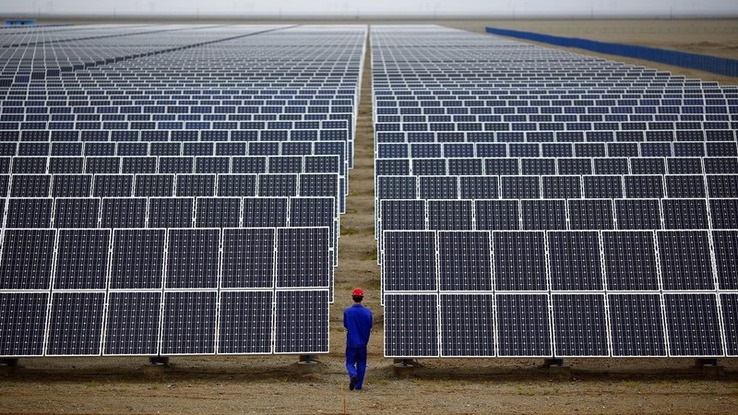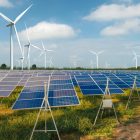It is becoming increasingly clear that renewable energy is not only an environmental imperative but also a necessity for economic growth. As the world seeks to reduce carbon emissions and combat climate change, renewable energy has become a critical component in achieving the goals of energy access, security, and net-zero.
For emerging economies in particular, the transition to renewable energy offers a range of benefits, including increased energy security, lower energy costs, and reduced environmental impact. While developed countries have been leading the way in adopting renewable energy technologies, emerging economies are also recognizing the potential benefits that these technologies offer.
In fact, many of these countries are taking significant steps to reduce their reliance on fossil fuels and promote the use of renewable energy sources. The adoption of renewable energy in emerging economies has the potential to increase energy security, reduce energy costs, and mitigate environmental impacts. In this piece, we will explore these benefits in more detail and discuss how renewable energy can play a critical role in the sustainable development of these economies.
What are the Benefits?
Renewable energy sources such as wind, solar, hydro, and geothermal power offer a range of benefits that can positively impact a country’s economic, social, and environmental well-being. One of the most significant benefits of renewable energy is increased energy security. Emerging economies that rely heavily on imported fossil fuels for their energy needs are often vulnerable to supply disruptions and price volatility. By transitioning to domestic renewable energy sources, these countries can reduce their dependence on imported fossil fuels and increase their energy independence.
Another key benefit of renewable energy is reduced energy costs. While the initial investment in renewable energy infrastructure can be substantial, the long-term operational costs are generally much lower than those of fossil fuel-based power plants. Renewable energy technologies have also become increasingly affordable in recent years, making them more accessible to emerging economies with limited financial resources. This cost savings can free up funds for other critical development needs, such as education, healthcare, and infrastructure.
The transition to renewable energy requires significant technology transfer and capacity building, particularly in emerging economies. The transfer of knowledge and technology from developed to developing countries can accelerate the deployment of renewable energy and facilitate economic development. Capacity building can also empower local communities and enable them to participate in the transition to renewable energy.
In addition to these economic benefits, renewables also have significant positive impacts on the environment. The use of renewable energy sources produces little to no greenhouse gas emissions, unlike fossil fuels, which are a significant contributor to climate change. By transitioning to renewable energy, emerging economies can reduce their carbon footprint and help mitigate the negative impacts of climate change, such as increased temperatures, rising sea levels, and extreme weather events. This shift to renewable energy can also improve air and water quality, protect ecosystems, and reduce the negative impacts on human health associated with traditional energy sources.
Usually, the fact that you have done most of the work for your prospect, and made it easy for them to navigate the sales process, positions you more compellingly and effectively. Such that eventually translates into stronger retention, better conversion rates, and higher ACV. Here are some points on the benefits of a consultative sales approach.
What are the Challenges?
In order for emerging economies to fully realize the benefits of renewable energy, it is crucial that they have strong policy frameworks in place to support investment in renewable energy projects. Unfortunately, numerous challenges tend to stand in their way.
One significant challenge is the lack of investment in renewable energy technologies. Many emerging economies face significant barriers to securing financing for these projects. According to the International Energy Agency, annual investments of $4.4 trillion are needed to achieve global energy transition goals. Much of this investment will need to come from private investors, but it is also essential for governments to provide regulatory frameworks and incentives to attract investors.
Many emerging economies are located in areas with abundant renewable energy resources, such as solar, wind, and hydro power. However, the high upfront costs of renewable energy infrastructure and the lack of investment capital make it difficult for these countries to fully take advantage of these resources. This can limit economic development, exacerbate poverty, and create social unrest, as citizens struggle to afford basic energy needs.
Moreover, the lack of investment in renewable energy technologies in emerging economies can also have a global impact, as these countries are significant emitters of greenhouse gases. Without access to affordable and clean energy sources, these countries may continue to rely on fossil fuels, increasing their carbon footprint and contributing to the overall global emissions problem. In order to address these challenges, it is critical to find ways to increase investment in renewable energy in emerging economies, which can help to address the challenges of energy security, economic development, and environmental sustainability.
Thankfully, with advances in technology and financing options such as green bonds and carbon credits, the cost of renewable energy is decreasing, making it increasingly accessible to emerging economies. In addition, some developed countries are providing financial and technical assistance to support the deployment of renewable energy systems in emerging economies.
Another challenge is the technological barriers associated with renewable energy adoption. Many emerging economies have limited technological capacity and may require additional support to develop and implement renewable energy projects. Governments can play a critical role in developing local technological capacity by investing in research and development, technology transfer, and education and training programs.
Policy and regulatory barriers are also significant obstacles to renewable energy adoption in emerging economies. Many countries lack the legal frameworks and policies necessary to support the growth of renewable energy markets. Additionally, regulatory barriers, such as tariffs and taxes on imported renewable energy products, can hinder the growth of these markets.
Success Stories in Renewable Energy Adoption
Despite these challenges, there are many examples of successful renewable energy adoption in emerging economies. For example, China has become the world’s largest producer of solar panels and wind turbines, and India has set a target to install 175 GW of renewable energy by 2022. Brazil has also made significant progress in adopting renewable energy, with over 80% of its electricity coming from renewable sources.
China’s success story in renewable energy adoption is an inspiring example of what is possible with strong government support, investment, and technological innovation. The country has since emerged one of the world’s largest investors and users of renewable energy, with a target of reaching 35% of energy consumption from non-fossil fuels by 2030. Through government support, massive investments worth billions of dollars, and growing a strong domestic market, and international cooperation; China appears poised for leadership in renewables as the world transitions to a low-carbon future.
In conclusion, renewable energy offers significant benefits for emerging economies seeking to reduce carbon emissions and improve energy security. However, significant challenges must be overcome to achieve widespread adoption of these technologies. Governments and private investors must work together to provide the financing, technological support, and policy frameworks necessary to support the growth of renewable energy markets in emerging economies.
Sources:
- International Energy Agency (IEA). (2020). World Energy Investment 2020. Retrieved from https://www.iea.org/reports/world-energy-investment-2020
- International Renewable Energy Agency (IRENA). (2021). Renewable Energy Market Analysis: Middle East and North Africa. Retrieved from https://www.irena.org/publications/2021/Mar/Renewable-Energy-Market-Analysis-Middle-East-and-North-Africa.
- World Bank Group. (2021). Renewable Energy for Developing Countries. Retrieved from https://www.worldbank.org/en/topic/energy/publication/renewable-energy-for-developing-countries




